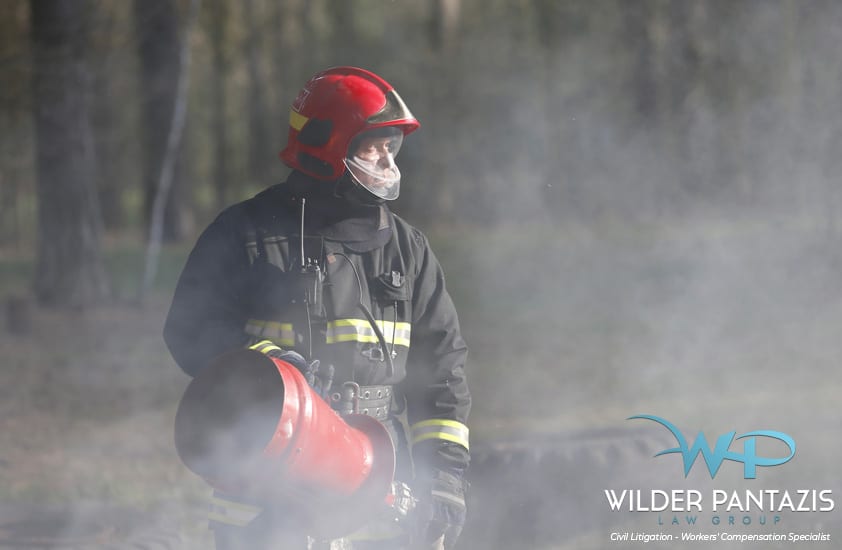
On Tuesday, November 16, 2021, North Carolina Gov. Roy Cooper signed a new bill into law sending much-needed financial help to certain firefighters who are diagnosed with cancer.
House Bill 535 (known as The Firefighters Fighting Cancer Act of 2021) “establishes the North Carolina Firefighter Cancer Health Care Benefit Plan to serve as a supplemental insurance policy providing certain specified benefits to eligible firefighters newly diagnosed with cancer.”
The primary sponsors of the Act were House Representatives Destin Hall (of Caldwell County), John Bell (of Greene, Johnston, Wayne counties), Jason Saine (of Lincoln County) and John Hardister (of Guilford County).
What is The Firefighters Fighting Cancer Act of 2021?
The Firefighters Fighting Cancer Act of 2021 creates a special fund to provide eligible firefighters with:
- Medical reimbursement (up to $12,000)
- $25,000 per cancer diagnosis (up to $50,000)
- 75% of monthly salary (up to $5000) for wage loss for a max of 36 months (to be offset by Social Security Disability or other disability payments)
Exceptions to HB 535
It’s important to note that there are a few caveats to this new law that may disqualify firefighters from receiving compensation from this special fund.
For starters, firefighters who are already receiving workers’ compensation benefits are not eligible for additional compensation through this fund.
What’s more, this law only applies to cancer diagnosed on or after Jan. 1, 2022, and it only applies to claims filed by June 30, 2023. However, it would apply to any new cancer diagnosed after Jan. 1, 2022, even if there has been a prior cancer of a different type formerly diagnosed.
Lastly, the law only applies to firefighters in North Carolina with at least 5 years of continuous service.
“While the Fund is certainly a step in the right direction, it’s no substitute for workers’ compensation benefits,” said Annamarie Pantazis of the Wilder Pantazis Law Group.
Firefighters are frequently exposed to occupational cancer
While these limitations can exclude some firefighters from qualifying for the benefits, it’s clear that something like this is much needed considering the hazards that North Carolina firefighters face on the job.
House Speaker Tim Moore acknowledged this need in a November 2021 speech he gave at the Professional Fire Fighters and Paramedic of North Carolina conference held in Asheville, saying:
“So, we know how important it is to make sure that firefighters and all of our first responders get not only the appropriate funding in terms of salary but also funding for safeguards and improved safety equipment and improved early intervention advancements to catch things before it advances and then in these unfortunate cases where cancer develops to make sure they have the resources to get the absolute best treatment they possibly can.”
According to Rep. Destin Hall, one of the bill’s primary sponsors:
“I think it’s outrageous. We’re the only state left in the entire country that doesn’t take care of our firefighters like we should. This bill will provide a much-needed layer of security for our brave firefighters and give them some extra peace of mind should they find themselves in a serious health crisis”
Compared to the general population, American firefighters are 9 percent more likely to be diagnosed with cancer and 14 percent more likely to die from cancer.
In a 2010 joint study conducted by the Centers for Disease Control & Prevention (CDC) and National Institute for Occupational Safety and Health (NIOSH), firefighters had a greater number of cancer diagnoses and cancer-related deaths—mostly digestive, oral, respiratory, and urinary cancers.
This study of nearly 30,000 firefighters also found that:
- There were about twice as many firefighters with malignant mesothelioma, a rare type of cancer caused by exposure to asbestos.
- Firefighters who were under 65 years of age had more bladder and prostate cancers than expected.
- The chance of lung cancer diagnosis or death increased with the amount of time spent at fires.
- The chance of leukemia death increased with the number of fire runs.
It’s certainly true that increased awareness can improve occupational cancer safety practices and exposure prevention methods such as proper training and use of protective equipment, which is important. But for the thousands of firefighters in North Carolina who develop cancer, HB 535 is a financial lifeline.
